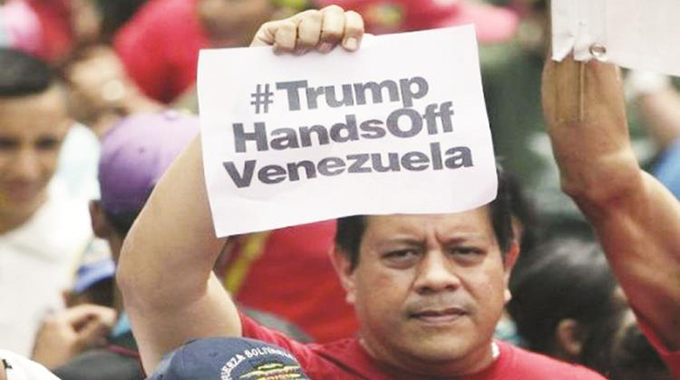Chamisa being fooled by events in Latin America . . .

Bevan Musoko Correspondent
There are very interesting parallels between political developments in Zimbabwe and in four South American countries, namely Chile, Bolivia, Ecuador and Venezuela.
In all these countries, there is political turbulence caused by austerity measures introduced to stem heavy public debts, and, to an extent, interference by the United States.
Latin America is facing a period of exceptional turbulence.
Massive anti-government protests driven by anger at the elites, failing public services and economic inequality have shaken these countries. Coupled with these internal challenges, political analysts have pointed a finger at US interference in these countries, specifically in Venezuela where the US has been open in its opposition to the socialist government of President Nicholas Maduro and in Zimbabwe where the US has imposed illegal sanctions to throttle Zanu-PF out of power, over the land reform.
Venezuela
The government of President Maduro and the opposition, led by the Head of the National Assembly, Juan Guaido, who is still youthful at 35 years of age, are engaged in a bitter power struggle. Their dispute centres on elections held in May 2018 which were won by President Maduro. Guaido disputed the results, accusing President Maduro of rigging.
Against this background, the US has always opposed the socialist government in the country since the era of late President Hugo Chavez. The US is opposed to the government’s nationalisation of Venezuela’s oil. The US has gone a propaganda offensive against the nationalisation of the country’s oil industry. Various media houses have published stories attacking socialism, blaming it for the country’s economic woes.
Among these headlines were “A socialist revolution can ruin almost any country”, “Venezuelan socialism still a complete disaster ” and “Authoritarian socialism caused Venezuela’s collapse”.
This kind of information warfare in which the US misrepresents the real situation in Venezuela by blaming it on socialism is similar to the information war being waged by the same US against Zimbabwe’s land reform programme.
The international community has been bombarded with propaganda that economic challenges facing Zimbabwe were caused by the revolutionary land reform programme.
The US does not admit the ruinous effects of its sanctions on the country’s leadership and industrial sector.
In the case of Venezuela, the US imposed sanctions on the country’s key economic sectors such as the oil, electricity and banking. The result has been massive suffering, disinvestment by multinational corporations, leading to high unemployment, energy crisis, national budget deficits and general hardships by ordinary citizens.
The US government has been open in its regime change agenda, going as far as recognising Guaido as the country’s president. Guaido himself committed treason by declaring himself president.
Together with the US, more than other 50 countries have recognised Guaido as president. In a significant counter-balance, both Russia and China, among others, have stood by President Maduro.
In Zimbabwe, the US has been unrelenting in its calls, just like the country’s opposition MDC party, for political, electoral and security sector reforms. The US clearly supports the MDC Alliance led by the youthful Nelson Chamisa.
The US sanctions law on Zimbabwe — the Zimbabwe Democracy and Economic Recovery Act — was reportedly authored by MDC lawyers with a view to clear their path to political office on the back of the suffering of the public.
As a result of the US sanctions, Zimbabwe’s industrial production has dropped, companies have closed shop and unemployment levels have gone up. Simultaneous with these developments has been a sharp rise in political polarisation among the country’s political parties, a situation which has seen sporadic violence by MDC against State and ZANU-PF targets.
Several people, including police officers, were injured and property worth millions of dollars has been destroyed during these MDC protests. The US has been conspicuous by its silence in condemning the MDC lawlessness.
Instead, the US State Department has been relentless in condemning Zimbabwe’s security forces who are operating under strained resource conditions to contain the MDC hooliganism. Here’s a case of condemning the victim.
The problems plaguing the Zimbabwean economy are not due to the land reform programme as claimed by the Western politicians and media, but to sabotage by forces taking their cue from the same US and European forces that are hostile to the revolutionary land reclamation programme. The US and Western media also exaggerate the violence that at time permeates Zimbabwe’s electoral processes.
Just like in the case of Zimbabwe, the US imposed sweeping sanctions on Venezuela, including a freeze on all Venezuelan government assets in the US and barring transactions with President Maduro’s administration.
On dialogue, President Mnangagwa has made it clear that he can negotiate with Chamisa, but under the framework of the Political Actors’ Dialogue (POLAD), despite the fact that Chamisa and his MDC has come out openly supporting the Western sanctions that have caused untold suffering among Zimbabweans. President Mnangagwa is magnanimous enough to be willing to engage the MDC leadership, despite its public record of appearing before the US Senate Foreign Relations Committee lobbying for sanctions.
In Zimbabwe, Chamisa has claimed on several occasions that he enjoys support among the country’s security forces, in a move analysts have interpreted as an attempt to incite the security forces to mutiny.
He is, however, oblivious to the fact that the command element of Zimbabwe’s security forces was born out of the crucible of the bitter liberation war, and is therefore very loyal to the ideals of the independence struggle they sacrificed their lives for.
While Venezuelans are suffering from the effects of the US embargo, they remain steadfast that they do not want a return to the neo-liberal policies that dominated the country prior to the introduction of socialism by Chavez.
Similarly, the command element in Zimbabwe has consistently conscientised the rank and file of the defence forces on the Western machinations.
Ecuador
In Ecuador, protests were organised against the government’s austerity measures including the cancellation of fuel subsidies, adopted by President Lenin Moreno’s administration.
On October 10, 2019, Ecuador remained paralysed as thousands of demonstrators marched and chanted demands for the return of the fuel subsidy and the resignation of President Moreno. This is the kind of lawlessness that the US supports.
Chile
In Chile, violent protests broke out following a government-sanctioned hike in transport fares. More than 11 people were killed in violent protests against the rising cost of living. At least five people died after looters torched a factory near the capital. The military and police used teargas against protesters, and a curfew was imposed in major cities for a third night. Some 10 500 police and soldiers were deployed on the streets. The US has not made as much noise as it does when Zimbabwe’s security forces use force to contain riotous MDC activists.
Bolivia
In Bolivia, the country’s first indigenous president, Evo Morales, tendered his resignation on November 10, 2019 amid deepening unrest over electoral fraud and under pressure from the armed forces.
According to State prosecutors, eight people died during the protests, including one police officer, while more than 300 have been wounded since the election.
The US government declared that it viewed Morales’ resignation as a boost for democracy and a “strong signal to the illegitimate regime of Venezuela that democracy and the will of the people will always prevail”.
From the foregoing situations of chaos in the Latin American countries, there is always a hand of the US government secretly abetting protestors to remove legitimately elected governments. The US has the temerity to support a self-declared impostor Guaido to the Venezuelan presidency simply because it is opposed to President Maduro’s socialist policies.
The US is thus behind the anarchy prevailing in these countries as it seeks to protect its own selfish geo-political interests.
Similarly, in Zimbabwe, the US has upped its war against the people of Zimbabwe for taking the bold step to redistribute land.
The US declared that Zimbabwe — a small country of around 14 million people — poses a “threat to US foreign policy.”
How this is so boggles the mind if one does not view the revolutionary land reform programme as the source of this threat.
The US is so committed to destroying the country’s economy to instil fear in other countries that may wish to replicate the Zimbabwe land reform programme in their own countries.
There are no significant human rights abuses in Zimbabwe beyond what can be considered normal in any country. The US itself is struggling to address the issue of police brutality against people of colour in its jurisdiction.
US prisons are populated by people of colour, not because they are criminals, but because the criminal justice system is inherently biased against them.
US police officers gun down innocent unarmed black people with impunity. President Trump has himself adopted the “America First” policy, which is a disguise for reviving white supremacy.
The US takes advantage of politicians like Guaido and Chamisa who are willing to subject their fellow countrymen to suffering for their selfish political ambitions.
Chamisa may be entertaining the hope that the political turbulence rocking Latin America can be replicated in Zimbabwe.
He is hoping to harvest political capital from the emerging youth bulge due to his youthful age, just like Guaido.
He hopes youths will one day suddenly rise against the Government, just like what happened leading to the Arab Spring in the Arab world. This explains the MDC’s political strategy, which can be reduced to one word — demonstrations. MDC does not articulate opposition developmental politics. Rather, it pursues scorched earth protest politics.
In Zimbabwe, politics goes beyond such considerations. It is a fact that the liberation war and its embedded ethos will continue to influence the political discourse for the foreseeable future.
Politics of collaboration with yesteryear neo-liberal colonisers was discarded in Zimbabwe in 1980.
Our compatriots in the MDC are yet to grasp this reality.
This is its undoing: dissociating itself from the popular nationalist struggle in favour of dalliance with imperial capital.
The US is only motivated by protecting its interests. It continues to be closely aligned with Saudi Arabia despite evidence that that country continues to silence dissenting voices.









Comments